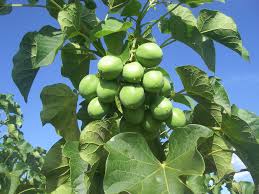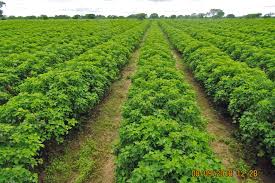![]()
If you’ve landed on this article page, you’re probably searching for a
good business idea—an idea that’s light on the pocket but heavy on
returns, promising both a fulfilling journey and potential profit.
|
How to start jatropha Farming in Nigeria
Jatropha farming is an emerging industry in Nigeria and Africa.
Jatropha curcas is a perennial shrub that produces oil-rich
seeds used in the production of biofuel, soap, and fertilizer.
Nigeria is among the leading producers of Jatropha oil in
Africa, with an estimated production capacity of over 300,000
tonnes per annum. The plant is drought-resistant and can be
grown on marginal lands, making it a promising crop for
smallholder farmers. In addition, the Jatropha plant has been
shown to have numerous health benefits and medicinal properties.
It takes up to 9 month for the plant to reach maturity. It is
propagated by nursing the seeds(certified seeds) for 2 - 3
months. Then the seedlings are transport to the open field for
transplanting. That is where the journey start from. Jatropha
can be cultivated both for fencing purpose and also on the field
for commercial purpose.
The planting population per acre is 1000 seedlings for
commercial purpose with planting spacing of 2m x 2m.But the
population for fencing depends on the farm perimeter and the
spacing adopted. The spacing for fencing ranges from 0.3m to 1m
spacing.
When use for fencing it serves as close boundary around field
and the seed can also be harvested for Jatropha oil production
The farming type required lesser weed management. The plants
form canopy after a year which reduce growth of weed.
Cover crops like potato can be intercropped with the plant this
serve as additional gain also also prevent weed growth.
jatropha is also of higher drought and fire resistance. it can
be planted within April till October (in dry season if source of
water will be provided). It is a one in life time investment,
which you only plant onces. After 9 months of planting,
harvesting starts till more than 15 years.
Average Yield is 1
to 2.5 tonne (2800kg) per acre depending on growth age. Minimum
Selling price of #200,000 per tone. For huge investors, you can
plant on large acres and processed the seeds to oil and export
oversea, we have large market outside NIGERIA that we can't even
meet the needed quantity.
One litre of jatropha oil range between 40,000 to 100,000 naira
The leaves of the Jatropha plant can be used as a natural
pesticide.
Jatropha farming can create employment opportunities in rural
areas, where job opportunities are often scarce.
Jatropha has a relatively short gestation period of 2-3 years,
making it an attractive option for farmers looking for quick
returns.
Jatropha can be grown in conjunction with other crops, such as
maize, cassava, or yam, allowing for intercropping and
maximizing land use.
The jatropha plant is not only beneficial for its oil, but its
leaves and stems can be used for animal feed, and its husks can
be used for fuel.
Jatropha is resistant to pests and diseases, reducing the need
for costly pesticides and herbicides.
Jatropha farming is environmentally friendly, as it is a
drought-resistant crop that requires minimal irrigation and does
not contribute to deforestation.
The jatropha plant can grow up to 5 meters tall, providing shade
and protection for other crops.
Jatropha oil is used in the production of soap, candles, and
lubricants.
Jatropha can be used to reclaim degraded land, as its deep roots
can help stabilize soil and prevent erosion.
Jatropha oil has a high heating value, making it an ideal fuel
source for power generation.
Jatropha oil can also be used in the production of biodiesel,
which has a lower carbon footprint than traditional diesel.
The jatropha plant is a hardy plant that can survive in harsh
environmental conditions, making it an ideal crop for farmers in
drought-prone areas.
Jatropha is a low-maintenance crop that requires little
attention once established.
Jatropha can be grown in marginal land, which is often
unsuitable for other crops.
The jatropha plant is not only beneficial for its oil, but its
leaves and stems can be used for composting.
Jatropha farming can contribute to rural development and poverty
reduction, as it provides an income source for small-scale
farmers.
With the right approach, starting a Jatropha farming business in
Nigeria and Africa can be a profitable venture for farmers and
entrepreneurs. The critical factors for success include market
research, adequate planning, investment in the right equipment,
and leveraging technology and innovation to optimize production
processes. By exploring the diverse applications of Jatropha,
such as biofuel production, soap making, and medicinal purposes,
farmers can maximize returns on investment and contribute to
sustainable development.
Get our Practical Guide on jatropha Farming in Nigeria. This
comprehensive guide will walk you through every aspect of
jatropha Farming in
Nigeria, from understanding the crop to marketing your harvest.
|







